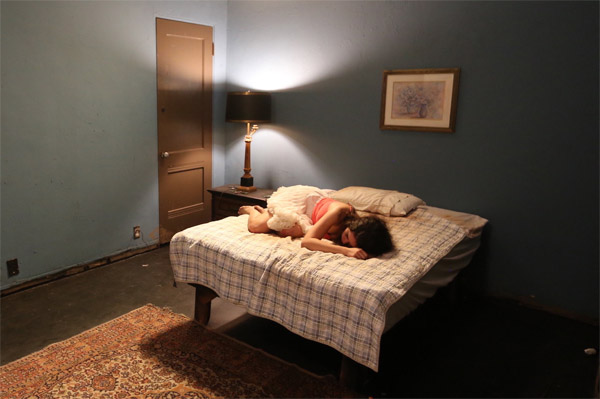Hollywood Producer, Julia Verdin had her Directorial Debut, Lost Girls, selected for this year’s Raindance Film Festival. We got a chance to see the film and took some time to ask her a few questions on the film.
Lost Girls tells the story of a former victim who is forced to lure young girls into sex trafficking is given an unexpected gift from a 15-year-old she kidnaps. It taps into her lost faith and memory of her former self and gives her the courage to confront her inner demons and dangerous employers in order to break free from the cycle of victimization.

British producer Julia Verdin was inspired to write this script and make her directorial debut, after volunteering at Children of the Night, a shelter for runaway girls and feeling heartbroken by the stories she heard of the abuses these very young girls had endured. Verdin is one of Hollywood’s leading independent producers, having produced 32 feature films to date including theatrical releases The Merchant of Venice starring Al Pacino and Jeremy Irons, 2 Jacks with Siena Miller, Danny Huston and Jack Huston and the critically acclaimed Stander with Thomas Jane and Deborah Unger
Verdin attracted a top level cast for her film. The child victim Marisol is played by rising star Christina Cibrian (ABC’s The Middle), Bar Paly (How I Met Your Mother) stars as Kara and Marisol Nichols(NCIS) as Romina. Whilst Marisol plays the sex trafficker, personally, she fights passionately against sex trafficking and created her own charity, Freedom for Slavery. Jamie Harris who plays the detective is known from the Rise of the Planet of the Apes and the Prestige, starring Hugh Jackman and Christian Bale.
Can you tell us about your experience volunteering with the Children of the Night shelter and your process from then to making this film?
I volunteered a Children’s shelter called Children of the Night, an organization that I started donating too after being very moved by a pamphlet I received in the mail years ago. They would have volunteers come in and do activities with the children. I was originally asked to do cold reading workshops with them but after a couple of sessions, as they did not want to be actors and the idea was more to get them to interact with each other and forget the painful things that had happened to them, I would do improvisation with them. One improvisation that they really enjoyed was around a singing contest. I then brought a Karaoke machine and would do karaoke workshops with them. They really enjoyed that and I got a lot of pleasure from seeing the way that they would come alive. I noticed that some of the kid’s seemed very closed down. As I started to hear some of their stories, I was shocked by some of the things that had happened to me to these very young girls. As I started to ask more questions and do more research, I was shocked to find out that the sex trafficking of minors was so prevalent. It is an issue that I feel very strongly about. I hate abuse of women and children in general and the idea of people abusing innocent kids in this way shocked me to the core and I wanted to do something more. My skill is being a storyteller and filmmaker and I know how powerful and affecting film can so I decided to make a film about it in hope of raising more awareness on the issue.
I did a lot of research whilst coming up with the story and the final script that I and my writing partner came up with is fictional but was inspired by different bits of various tragic stories that I heard. I spoke to organizations, detectives, and victims and attended conferences and also read up a lot on the subject. Kim Biddle from http://www.savinginnocence.org was particularly helpful and gave me a lot of information and stories and feedback on our script.
I decided to set the film in the US as the common perception seemed to be that sex trafficking is a 3rd world problem but in reality, it is a global one with LA, NY, Dallas and London being 4 of the biggest cities in the world where it goes on.
It was a very dark world to investigate and some of the stories I heard during my research were heartbreaking.
How did you cast the film?
Luckily I have a great relationship with a number of wonderful actors and so was able to cast the film through reaching out to some of them. Marisol Nichols was the first actress I cast in the film. I was introduced to her at Johnny Depp’s Christmas party. I told her that I was writing a script and had named my lead character Marisol. She asked me what is was about and I told her it was about sex trafficking. She told me that this was an issue she was passionate about and that she had made many trips to Capitol Hill to help further anti-trafficking legislation.and was very involved in this issue and we ended up chatting for 3 hours. I knew her work as an actress and asked if she would like to read the script. Ironically she plays the role of Romina the trafficker in the movie. Marisol has recently set up a charity http://www.slaveryfreeworld.org
For Kara, I wanted to cast someone beautiful with enormous charm and charisma who would not seem suspicious and had the acting ability to show the internal conflict that Kara goes through. I had known Bar Paly for many years and knew that she had the qualities and the acting chops needed. She has become a big star but luckily when I told her about the project she was passionate about the issue and liked the role and so came on board. Rena Owen and Jamie Harris are brilliant actors who are old friends and kindly came on board to support me and the project too. I had worked with Siena Goines who plays the mother in a film I produced called “The Least Among You.” and she had given a wonderful heartfelt performance and so I knew she would be perfect for the role. We auditioned many actors for the roles of Marisol, Greg, and Beth to find the right choices. The Marisol and Beth roles were the two hardest roles to cast as for Marisol, I needed to cast an actress over eighteen who could play fifteen and had a real innocence about her. I read many young actresses and eventually decided to cast Cristina Cibrian as she had the innocence and naiveté that I was looking for and could play very young. It was a tough role for her to play and so had several talks with her before filming to make sure that she understood what the role would involve. The actress we cast for Beth was 15 and so we had her mother and a teacher on set. I also talked with both her and her mother in detail about the role to make sure that they were comfortable with the dark subject matter. Despite her young age, before coming into the audition, she had gone online and done research into the issue and both she and her mother passionately wanted to be a part of raising awareness. Will Brandt who I cast for Greg did a lot of research to prepare for the role to find the darker side of Greg and we talked a lot about the ways this type of character would use manipulation to control Kara.
What response do you hope to get from Lost Girls?
I hope that people will see the film and that it will raise awareness to this growing problem and encourage them to help in whatever way they can. There are so many ways in which people can help. Organizations need donations, volunteers, hygiene products and clothes for rescue victims. Bills to push through stronger legislation on this issue need support. Governments need to be pressured to allocate more resources to the police and organizations. I hope that parents become more aware of signs to look out for. I hope that teenagers become more suspicious of strangers that try to befriend them. I think if people become more aware that this is something that is going on, it will make them more conscious and so if they see strange activity going on anywhere will report it. I would love to see schools start to do education around this issue as from what I am hearing from some of the organizations working in this area, traffickers are starting to send recruiters around school areas and malls so it is really important that education around this happens.
How was this film different to other films you produced?
I have produced a variety of films in many different genres from action thrillers to comedy, period pieces such as Merchant of Venice and Stander, eclectic art house films such as 2 Jacks. I also produced an inspirational film “The Least Among You” and got many beautiful letters from people. I try to find interesting stories and every film I have made has some sort of message or subtext within it. 2 Jacks for example, with Jacklyn Bisset’s character we showed how people often get stuck in life by hanging on to memories and glorifying the past rather than living in the present and enjoying life as it is.
Why did you choose this as your directorial debut as opposed to remaining in just a producer role?
The idea of doing a film on Sex trafficking floated around in my head for a couple of years. Originally I was planning to find a good script to produce. I read a number of scripts on the subject but never found one that I felt was really right or the story that I wanted to tell based on the research I had done. I like new challenges and having produced for many years, I wanted to try something new. I was well aware of how time intensive directing is and decided if I wanted to give this a go, I wanted to tell a story that I felt passionately about and also make a film that would contribute to the world. I have got to a point in my life and an age where I have started to think about what I am leaving behind as my legacy and now really want to focus on making films that hopefully can make a difference. I decided to sit down and write a script myself. I came up with a story outline and then as it was the first script I was attempting to write, I found a young writer, Janet Odogwu to work on the script with me. It took us about 9 months to come up with a script that we were happy with. I then sent the script out to organizations fighting against sex trafficking for input as I wanted to make sure that I was making a realistic portrayal that would do the issue justice. Whilst finalizing the script, I was also thinking about how I would direct the film and the visual language that I would use to tell the story. I watched a lot of other films on the subject and also looked at reviews to see what audiences hadn’t responded to. I continued to do research and talked to as many people as possible. I spent about 3 months scouting locations, casting and finding the right team to make the project with me and then our actual shoot was 5 days. The editing and post-production took about 9 months. I am planning to direct a feature film set in the same world but this time focusing on a teenager who has been trafficked and how it affects not just her but her whole family and the difficulty she has to reintegrate into life and recovering from trauma, the challenge of whether to testify and help save other still missing girls but possibly at the risk of her and her family’s safety. We are also developing other social message films about honor killings and teen bullying.
Why did you decide to end Marisol’s journey in the film the way you did?
As my goal with this film is to raise awareness and shed light on this problem, having studied social message filmmaking and film in general, I think if you make a film that is too dark and too in your face shocking, you risk making something that is so uncomfortable that people will just not watch it or you will attract the wrong type of audience. I particularly want my audience to be teenage girls and parents. I want to them to get an understanding of the world but also be left with a little hope. As I believe in life whatever bad situations may happen, if you choose to have courage and strength you have a better chance of survival and finding a way out. The reality sadly is that many young girls are still captive and I wanted to bring this point home by ending with the montage of still missing posters to highlight this.
Related Article: Lost Girls Review













